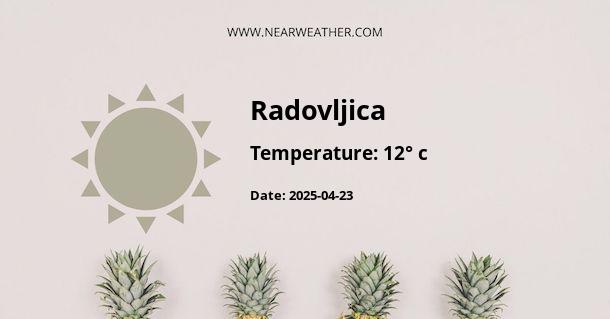Understanding the Climate and Weather Patterns in Občina Radovljica, Slovenia
Located in the heart of the Gorenjska region of Slovenia, Občina Radovljica boasts a unique climate influenced by its diverse landscape, which includes river valleys, rolling hills, and portions of the Alps. The area experiences a mixture of Alpine and Continental climate characteristics, leading to distinctive weather patterns year-round. This analysis provides a comprehensive overview of Radovljica's climatic conditions, delivering valuable insights for residents, tourists, and meteorological enthusiasts alike.
Geographical Setting
Location: Radovljica lies in northwestern Slovenia and is part of the Upper Carniola statistical region, contributing to its climatic variation.
Seasonal Climate Overview
The climate in Občina Radovljica exhibits four distinct seasons: warm summers, colorful autumns, cold winters, and fresh springs. Below is a breakdown of what to expect in each season in terms of weather.
Spring
- Temperature: Average daytime temperatures range from 10°C to 18°C (50°F to 64°F), while nights can hover just above freezing early in the season.
- Precipitation: Spring is characterized by moderate rainfall, with increasing intensity leading into summer.
- Special Considerations: Late frost can sometimes affect the blooming of plants in the valleys.
Summer
- Temperature: Average temperatures range from 20°C to 30°C (68°F to 86°F), occasionally exceeding 30°C during heatwaves.
- Precipitation: Summers see the highest rainfall of the year, with thunderstorms being particularly common in the afternoons.
- Special Considerations: Hiking and outdoor activities are prevalent during this time but can be hindered by sudden storms.
Autumn
- Temperature: Cooling temperatures range from 8°C to 18°C (46°F to 64°F), with crisper nights as winter approaches.
- Precipitation: Early autumn can be relatively dry, but rain increases in November, leading to a damp end of the season.
- Special Considerations: Fog is more common in the valleys, and first snowfall can occur in the Alpine areas.
Winter
- Temperature: Daytime temperatures average between -2°C and 3°C (28°F to 37°F), often dropping below freezing at night.
- Precipitation: Snowfall is common, particularly in elevated areas, contributing to Radovljica’s winter charm.
- Special Considerations: Winter sports are popular, but travelers should be mindful of avalanche risks in mountainous areas.
Detailed Monthly Weather in Radovljica
Note: The following monthly breakdown is based on historical averages and can help plan travel or activities around typical weather conditions, but actual conditions may vary.
| Month | Temperature Range (°C) | Precipitation |
|---|---|---|
| January | -5 to 3 | 75 mm |
| February | -3 to 5 | 70 mm |
| March | 0 to 10 | 90 mm |
| April | 4 to 15 | 110 mm |
| May | 9 to 20 | 130 mm |
| June | 13 to 24 | 150 mm |
| July | 15 to 26 | 140 mm |
| August | 15 to 26 | 140 mm |
| September | 11 to 21 | 130 mm |
| October | 7 to 15 | 120 mm |
| November | 2 to 8 | 150 mm |
| December | -3 to 3 | 100 mm |
Climate Influences
Several climatic influences converge to mold the weather experienced in Radovljica:
- Alpine Influence: Due to its proximity to the Alps, Radovljica can experience heavy snowfall and cold temperatures in winter, along with cooler and wetter summers at higher altitudes.
- Continental Influence: The Continental climate contributes to the wide temperature ranges between seasons, with hot summers and cold winters in the valley areas.
Extreme Weather Events
Radovljica, like many regions, is not immune to extreme weather phenomena. These events, though rare, include:
- Severe Thunderstorms: Summer month thunderstorms can occasionally be severe, with intense rainfall, hail, and strong winds.
- Snowstorms: Heavy snowfall can lead to transportation disruptions and increased avalanche risk.
Annual Weather Averages
An understanding of the long-term weather averages is critical for any industry-specific operations, including agriculture, tourism, and infrastructure planning:
- Annual Temperature: The average annual temperature in Radovljica hovers around 10°C (50°F).
- Annual Precipitation: The region accumulates approximately 1,400 mm of precipitation each year, with variations depending on the topography.
Climate Changes and Impact
Like many parts of the world, Radovljica faces the challenges of climate change, which may alter weather patterns in the form of increased precipitation variability, temperature fluctuations, and more frequent and intense extreme weather events. Authorities and researchers closely monitor these changes to adopt relevant adaptive strategies.
Conclusion
Overall, the climate in Občina Radovljica provides an enticing canvas for those interested in exploring diverse weather patterns influenced by Alpine and Continental forces. Whether you're an adventure-seeker looking to immerse in the great outdoors or a local resident interested in the region's climatology, Radovljica's weather offers year-round interest and surprise.
A - Radovljica's Latitude is 46.337780 & Longitude is 14.194170.
A - Weather in Radovljica is 12° today.
A - Climate Conditions in Radovljica shows overcast clouds today.
A - Humidity in Radovljica is 91% today.
A - Wind speed in Radovljica is 1.01 km/h, flowing at 268° wind direction. today.
